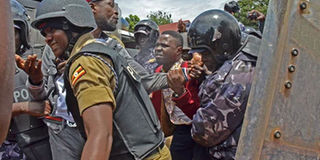Diplomats raise alarm about Uganda's crackdown on media freedom

Police arrest Kyadondo East MP Robert Kyagulanyi, alias Bobi Wine (in cap), and his Mityana counterpart Francis Zaake on Busaabala Road near One Love Beach in the outskirts of Kampala last week. UCC wants journalists to stop covering such operations. File photo
Diplomats from the EU, US and another 14 countries on Friday raised alarm about Uganda's clampdown on media freedoms and protests after the arrest of popular rapper-turned-MP Bobi Wine.
"We are deeply concerned with a series of recent incidents restricting the freedom of expression and freedom of assembly in Uganda," a joint statement from the missions read.
The statement came after the Uganda Communications Commission called for 13 radio and TV stations to suspend their news editors, producers and heads of programming over their coverage of Wine's arrest on Monday.
The singer, whose real name is Robert Kyagulanyi, was detained for allegedly staging an illegal protest in 2018 -- charges fellow opposition MPs decried as ridiculous.
He was freed on bail on Thursday.
"We are also concerned about the excessive use of force by Ugandan police and security services against peaceful protesters and political opposition," the joint statement read.
The popular singer is the figurehead of a new generation who grew up under President Yoweri Museveni but want to see change. His anti-government songs have helped win him a big following.
He has emerged a real challenger to the veteran president who intends to run for a sixth term in 2021.
Ugandan authorities have frustrated Wine's efforts to hold concerts at his private beach, and have detained him repeatedly for procedural misdemeanours.
His detention prompted protests in Kampala that were broken up by police with teargas and rubber bullets.
The directive calling for the sacking of top media officials caused outrage in the country.
"In total, over 30 journalists are on the verge of losing their jobs," the Uganda Journalists Association said in a statement Thursday.
"Government through its several agencies should respect the rights of media practitioners."
Amnesty International said the order was a "blatant attack on press freedom"
RELATED STORIES




